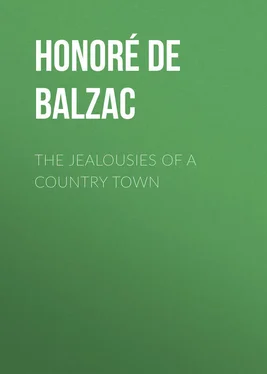Honoré Balzac - The Jealousies of a Country Town
Здесь есть возможность читать онлайн «Honoré Balzac - The Jealousies of a Country Town» — ознакомительный отрывок электронной книги совершенно бесплатно, а после прочтения отрывка купить полную версию. В некоторых случаях можно слушать аудио, скачать через торрент в формате fb2 и присутствует краткое содержание. Жанр: literature_19, foreign_antique, foreign_prose, на английском языке. Описание произведения, (предисловие) а так же отзывы посетителей доступны на портале библиотеки ЛибКат.
- Название:The Jealousies of a Country Town
- Автор:
- Жанр:
- Год:неизвестен
- ISBN:нет данных
- Рейтинг книги:5 / 5. Голосов: 1
-
Избранное:Добавить в избранное
- Отзывы:
-
Ваша оценка:
- 100
- 1
- 2
- 3
- 4
- 5
The Jealousies of a Country Town: краткое содержание, описание и аннотация
Предлагаем к чтению аннотацию, описание, краткое содержание или предисловие (зависит от того, что написал сам автор книги «The Jealousies of a Country Town»). Если вы не нашли необходимую информацию о книге — напишите в комментариях, мы постараемся отыскать её.
The Jealousies of a Country Town — читать онлайн ознакомительный отрывок
Ниже представлен текст книги, разбитый по страницам. Система сохранения места последней прочитанной страницы, позволяет с удобством читать онлайн бесплатно книгу «The Jealousies of a Country Town», без необходимости каждый раз заново искать на чём Вы остановились. Поставьте закладку, и сможете в любой момент перейти на страницу, на которой закончили чтение.
Интервал:
Закладка:
The upper floor contained a complete apartment for a family household, and a suite of rooms where the venerable Abbe de Sponde had his abode. The garrets offered fine quarters to the rats and mice, whose nocturnal performances were related by Mademoiselle Cormon to the Chevalier de Valois, with many expressions of surprise at the inutility of her efforts to get rid of them. The garden, about half an acre in size, is margined by the Brillante, so named from the particles of mica which sparkle in its bed elsewhere than in the Val-Noble, where its shallow waters are stained by the dyehouses, and loaded with refuse from the other industries of the town. The shore opposite to Mademoiselle Cormon's garden is crowded with houses where a variety of trades are carried on; happily for her, the occupants are quiet people, – a baker, a cleaner, an upholsterer, and several bourgeois. The garden, full of common flowers, ends in a natural terrace, forming a quay, down which are several steps leading to the river. Imagine on the balustrade of this terrace a number of tall vases of blue and white pottery, in which are gilliflowers; and to right and left, along the neighboring walls, hedges of linden closely trimmed in, and you will gain an idea of the landscape, full of tranquil chastity, modest cheerfulness, but commonplace withal, which surrounded the venerable edifice of the Cormon family. What peace! what tranquillity! nothing pretentious, but nothing transitory; all seems eternal there!
The ground-floor is devoted wholly to the reception-rooms. The old, unchangeable provincial spirit pervades them. The great square salon has four windows, modestly cased in woodwork painted gray. A single oblong mirror is placed above the fireplace; the top of its frame represented the Dawn led by the Hours, and painted in camaieu (two shades of one color). This style of painting infested the decorative art of the day, especially above door-frames, where the artist displayed his eternal Seasons, and made you, in most houses in the centre of France, abhor the odious Cupids, endlessly employed in skating, gleaning, twirling, or garlanding one another with flowers. Each window was draped in green damask curtains, looped up by heavy cords, which made them resemble a vast dais. The furniture, covered with tapestry, the woodwork, painted and varnished, and remarkable for the twisted forms so much the fashion in the last century, bore scenes from the fables of La Fontaine on the chair-backs; some of this tapestry had been mended. The ceiling was divided at the centre of the room by a huge beam, from which depended an old chandelier of rock-crystal swathed in green gauze. On the fireplace were two vases in Sevres blue, and two old girandoles attached to the frame of the mirror, and a clock, the subject of which, taken from the last scene of the "Deserteur," proved the enormous popularity of Sedaine's work. This clock, of bronze-gilt, bore eleven personages upon it, each about four inches tall. At the back the Deserter was seen issuing from prison between the soldiers; in the foreground the young woman lay fainting, and pointing to his pardon. On the walls of this salon were several of the more recent portraits of the family, – one or two by Rigaud, and three pastels by Latour. Four card tables, a backgammon board, and a piquet table occupied the vast room, the only one in the house, by the bye, which was ceiled.
The dining-room, paved in black and white stone, not ceiled, and its beams painted, was furnished with one of those enormous sideboards with marble tops, required by the war waged in the provinces against the human stomach. The walls, painted in fresco, represented a flowery trellis. The seats were of varnished cane, and the doors of natural wood. All things about the place carried out the patriarchal air which emanated from the inside as well as the outside of the house. The genius of the provinces preserved everything; nothing was new or old, neither young nor decrepit. A cold precision made itself felt throughout.
Tourists in Normandy, Brittany, Maine, and Anjou must all have seen in the capitals of those provinces many houses which resemble more or less that of the Cormons; for it is, in its way, an archetype of the burgher houses in that region of France, and it deserves a place in this history because it serves to explain manners and customs, and represents ideas. Who does not already feel that life must have been calm and monotonously regular in this old edifice? It contained a library; but that was placed below the level of the river. The books were well bound and shelved, and the dust, far from injuring them, only made them valuable. They were preserved with the care given in these provinces deprived of vineyards to other native products, desirable for their antique perfume, and issued by the presses of Bourgogne, Touraine, Gascogne, and the South. The cost of transportation was too great to allow any but the best products to be imported.
The basis of Mademoiselle Cormon's society consisted of about one hundred and fifty persons; some went at times to the country; others were occasionally ill; a few travelled about the department on business; but certain of the faithful came every night (unless invited elsewhere), and so did certain others compelled by duties or by habit to live permanently in the town. All the personages were of ripe age; few among them had ever travelled; nearly all had spent their lives in the provinces, and some had taken part in the chouannerie. The latter were beginning to speak fearlessly of that war, now that rewards were being showered on the defenders of the good cause. Monsieur de Valois, one of the movers in the last uprising (during which the Marquis de Montauran, betrayed by his mistress, perished in spite of the devotion of Marche-a-Terre, now tranquilly raising cattle for the market near Mayenne), – Monsieur de Valois had, during the last six months, given the key to several choice stratagems practised upon an old republican named Hulot, the commander of a demi-brigade stationed at Alencon from 1798 to 1800, who had left many memories in the place. [See "The Chouans."]
The women of this society took little pains with their dress, except on Wednesdays, when Mademoiselle Cormon gave a dinner, on which occasion the guests invited on the previous Wednesday paid their "visit of digestion." Wednesdays were gala days: the assembly was numerous; guests and visitors appeared in fiocchi; some women brought their sewing, knitting, or worsted work; the young girls were not ashamed to make patterns for the Alencon point lace, with the proceeds of which they paid for their personal expenses. Certain husbands brought their wives out of policy, for young men were few in that house; not a word could be whispered in any ear without attracting the attention of all; there was therefore no danger, either for young girls or wives, of love-making.
Every evening, at six o'clock, the long antechamber received its furniture. Each habitue brought his cane, his cloak, his lantern. All these persons knew each other so well, and their habits and ways were so familiarly patriarchal, that if by chance the old Abbe de Sponde was lying down, or Mademoiselle Cormon was in her chamber, neither Josette, the maid, nor Jacquelin, the man-servant, nor Mariette, the cook, informed them. The first comer received the second; then, when the company were sufficiently numerous for whist, piquet, or boston, they began the game without awaiting either the Abbe de Sponde or mademoiselle. If it was dark, Josette or Jacquelin would hasten to light the candles as soon as the first bell rang. Seeing the salon lighted up, the abbe would slowly hurry to come down. Every evening the backgammon and the piquet tables, the three boston tables, and the whist table were filled, – which gave occupation to twenty-five or thirty persons; but as many as forty were usually present. Jacquelin would then light the candles in the other rooms.
Читать дальшеИнтервал:
Закладка:
Похожие книги на «The Jealousies of a Country Town»
Представляем Вашему вниманию похожие книги на «The Jealousies of a Country Town» списком для выбора. Мы отобрали схожую по названию и смыслу литературу в надежде предоставить читателям больше вариантов отыскать новые, интересные, ещё непрочитанные произведения.
Обсуждение, отзывы о книге «The Jealousies of a Country Town» и просто собственные мнения читателей. Оставьте ваши комментарии, напишите, что Вы думаете о произведении, его смысле или главных героях. Укажите что конкретно понравилось, а что нет, и почему Вы так считаете.












